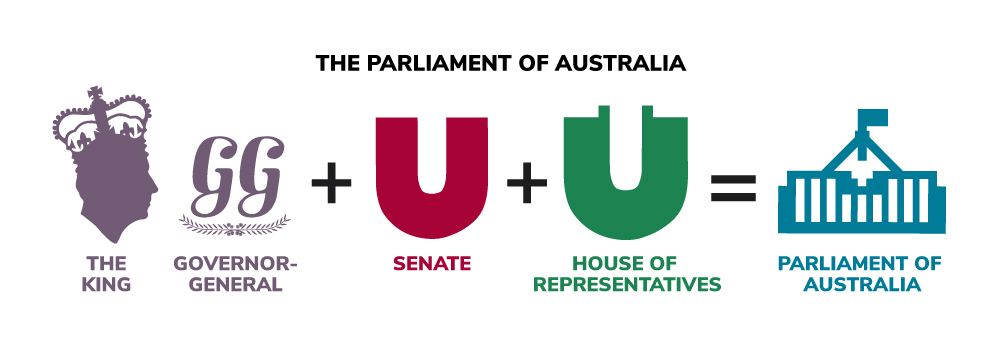Australian Parliament
This fact sheet outlines the composition and role of the Australian Parliament.
What will I learn?
- The Australian Parliament is made up of the King (represented by the Governor-General), the Senate and the House of Representatives.
- The Parliament makes laws, represents Australians, scrutinises the government and provides a place where government is formed.
Curriculum alignment
Year 6 ACHASSK143
Year 7 ACHCK048
What is the Australian Parliament?
The Australian Parliament is made up of the King (represented by the Governor-General), the Senate and the House of Representatives.
The structure and power of the Parliament is set out in the Australian Constitution. The Parliament was established at Federation on 1 January 1901. The Parliament meets at Parliament House in Canberra.
Parliament of Australia

Parliamentary Education Office (peo.gov.au)
Description
This diagram illustrates the composition of the Australian Parliament. The Australian Parliament is made up of the King (represented by the Governor-General), the Senate and the House of Representatives.
Copyright information
This work is licensed under a Creative Commons Attribution-NonCommercial-NoDerivs 3.0 Unported License.
You are free to share – to copy, distribute and transmit the work.
Attribution – you must attribute the work in the manner specified by the author or licensor (but not in any way that suggests that they endorse you or your use of the work).
Non-commercial – you may not use this work for commercial purposes.
No derivative works – you may not alter, transform, or build upon this work.
Waiver – any of the above conditions can be waived if you get permission from the copyright holder.
The role of Parliament
The Australian Parliament:
- makes and changes laws
- represents the people of Australia
- is the place where government is formed
- scrutinises – closely examines – the work of the government.
Law-making
The Parliament makes new laws and amends – changes – existing laws. When Parliament meets, Senators and Members of the House of Representatives spend around half their time considering bills – proposals for new laws. A bill is usually a response to a problem or a way to improve things for the people of Australia. To become a law, a bill must be agreed to by a majority vote in the Senate and the House of Representatives and be given Royal Assent by the Governor-General.
Representing Australians
Members of parliament are elected to represent the views and interests of Australians:
- There are 76 senators who represent states and territories in the Senate. There are 12 senators from each state and 2 senators each from the Australian Capital Territory and Northern Territory.
- There are 151 members of the House of Representatives. Each member represents one of the 151 electorates in Australia.
Members of parliament represent Australians by considering how bills and decisions of Parliament will affect them. Members of parliament also find out about people's interests and concerns and speak about them in Parliament. Members of parliament help their constituents – the people they represent – if they are having difficulties with issues such as taxes, immigration or pensions.
Formation of government
The Australian Government is formed in the House of Representatives. The government is the party or coalition of parties with the support of the majority of members in the House.
The government makes plans for managing national issues like trade, immigration and defence. Laws made by the Parliament are put into action by the government. The government also represents Australia internationally.
Scrutiny
The Parliament scrutinises the work of the government by:
- setting up committees to investigate bills in detail
- looking at how the government has spent tax-payers' money in Senate estimates hearings
- questioning the government each sitting day in Question Time in the Senate and House.
By checking their work, the parliament helps to make sure the government acts responsibly when making decisions, spending public money and representing the people.
